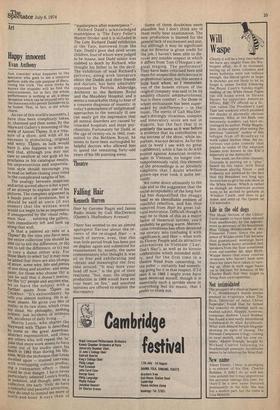Theatre
Falling Hair
Kenneth Hurren
Hair by Gerome Ragni and James Rado; music by Galt MacDermot (Queen's, Shaftesbury Avenue) There has seemed to me an almost apologetic flavour about the reviews of the re-staged Hair — a touch of sorrow, even, that this wan little period freak has been put on display again and submitted for reassessment by, mostly, the same commentators who thought it was all so free and exhilarating and vibrant and meaningful the first time around. "It may bore your head off now," is the gist of their reactions, "but, man, the original production in 1968 would have set your heart on fire," and assorted opinions are offered to explain the discrepancy. Some of them doubtless seem plausible, but I don't think any of them really bear examination. The new production is blamed for the general lack of excitement and zest,
but although it may be significant that no director is given credit for the job, I haven't been able to discover any notable respect in which it differs from Tom O'Horgan's original staging. The performers? They have been criticised here and there for unspecified deficiencies in professional talent; but this seems a little hard when, as I remember, one of the honest virtues of the original company was said to be its amiably chaotic amateurishness. Nor is there comfort — for those in whom enthusiasm has been superseded by indifference — in the music. The merits of Galt MacDermot's drivingly vivacious, complex and innovatory score are not in dispute, but the fact that it is precisely the same as it was before is evidence that its contribution to the success of the show, while important, was not decisive. As for the plot (a word I use with no great confidence), while it has to do with protest against American involvement in Vietnam, no longer contemporaneously valid, this element of the proceedings is so jocularly simplistic that I doubt whether grown-ups ever took it quite seriously.
We come down ultimately to the title and to the suggestion that the social acceptability of the long-hair fad has disqualified the shaggy head as an identifiable emblem of youthful rebellion, and has thus removed from Hair its great cultural motivation. Difficult though it may be to think of this as a major factor of theatrical success, you'd probably be getting warm. Meretri cious trendiness has often deceived
the unwary into confusing it with significance, and Hair — what with its Flower People and its attractive
alternatives to Vietnam ('Lay, Don't Slay'), as well as its hirsute celebrations which extended mild ly, and for the first time in a
theatre freed from censorship, to the pubic — certainly had someth
ing going for it in that respect. If I'd seen it in 1968 I might even have been deceived myself, though it is essentially such a terrible show in everything but its music, that I prefer to think not.


































 Previous page
Previous page